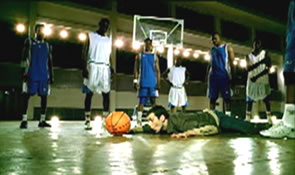The Mirinda drinker doesn't give a rat's ass what the rest of the world thinks." That's perhaps not the most elegant turn of phrase you could use to describe a target group, but Soumitra Karnik stands by his words. And he should know.
Karnik is not just a self-confessed Mirinda-holic -- eight bottles a day of the orange-flavoured fizz is normal -- he's also the vice president and senior creative director of JWT, the agency that's handled the Mirinda account for the past 15 years, since the launch of the drink in India by PepsiCo.
Given his single-mindedness regarding his choice of drink, it's not surprising that Karnik's latest work on the Mirinda account also reflects that almost-obsessive desire to not leave even a drop in the bottle. JWT's new ad for Mirinda appeared on television screens about 10 days ago.
For the next six to eight weeks, the 40-second ad will play on most niche and mainstream cable and satellite channels, with an emphasis on the southern language channels. Thirty-second edits will also be broadcast.
The ad shows a young man trying to suck in an orange table tennis ball, resting his head near the net. At a doctor's waiting room, people turn around and stare as he attempts to inhale a bunch of orange gerberas.
 Next he's lying face down on the ground in a basketball court, trying his luck with the basketball, even as the players watch bemused.
Next he's lying face down on the ground in a basketball court, trying his luck with the basketball, even as the players watch bemused.
An orange tag on a woman's handbag inspires him to squat, frog-like, inside a lift and attempt to breathe it in and then it's a small, Volkswagen Beetle model. This time, when the young man pulls in his breath, the car moves. He smiles, satisfied.
In the next shot, he's seen guzzling a bottle of Mirinda. When it empties, he peers into the bottle and sees a last drop. His practice pays off: he is able to suck in even that last little drop. A male voiceover intones breathily, "More orange-y Mirinda. Chhodna mat."</i>
This is Mirinda's second television commercial of the year. The first was the 40-second bhai ad that showed two rival gang leaders facing off in the college grounds, only to have their groups desert them for drinks of Mirinda.
That ad, which was launched in February, was a continuation of the "Taste aisa chaaye, character phisla jaaye" slugline Mirinda adopted about three years ago.
What prompted a second ad in the same season? The strategy has a lot to do with the climate: once the monsoons retreat, the heat picks up again, especially in the south. As the temperature rises, so does the sales graph of soft drinks.
Given the impact on the topline, soft drink majors are convinced that re-emphasising top-of-mind recall for their brands is worth the investment. "Seasonality is less of an issue in the south. We like to ensure we get relevant levels of media delivery in these regions," accepts Punita Lal, executive director, marketing, PepsiCo India.
How does that work? PepsiCo's marketing team apparently takes a call on what it feels a brand needs for the "second summer". The choices vary from on-ground activities and thematic presentations to a reiteration of communication.
This year, the company's decided to focus on advertising -- communication for the cola brand, too, has been refreshed. But given that the bhai ad had run its course -- it was on air for 12 to 14 weeks -- PepsiCo thought it appropriate to "refresh the taste proposition."
Of course, this isn't the first time Mirinda's added a second act; last year, too, it began the season with a spoof on the Hutch pug and signed off with a commercial that showed an old woman preferring to stay with her Mirinda rather than leave with her son.
The difference this year is that the new ad doesn't share the same slugline -- even the voiceover chhodna mat does not appear as a super in the last frame. "We're concentrating single-mindedly on the taste and that Mirinda is the more orange-y orange drinks," says Karnik.
There's a reason for that. Internal research by PepsiCo has shown that taste is the core category driver for orange drinks. That could work to PepsiCo in a soft drink market where loyalties seem to be switching from cola.
"In the past three years, orange and lime-lemon have significantly increased their share of market," says Lal. She adds that part of the reason is the pesticides' controversy affected cola drinks more than other flavours. Also, "repertoire" consumers (those who switch between flavours) are swinging towards orange.
Which is why the new ad is targeted at the consumer who drinks Pepsi and 7-Up. "Orange drinks have a younger appeal, but they are not kiddie drinks," says Karnik. He knows.






